Tag Archives: how hotel management system works

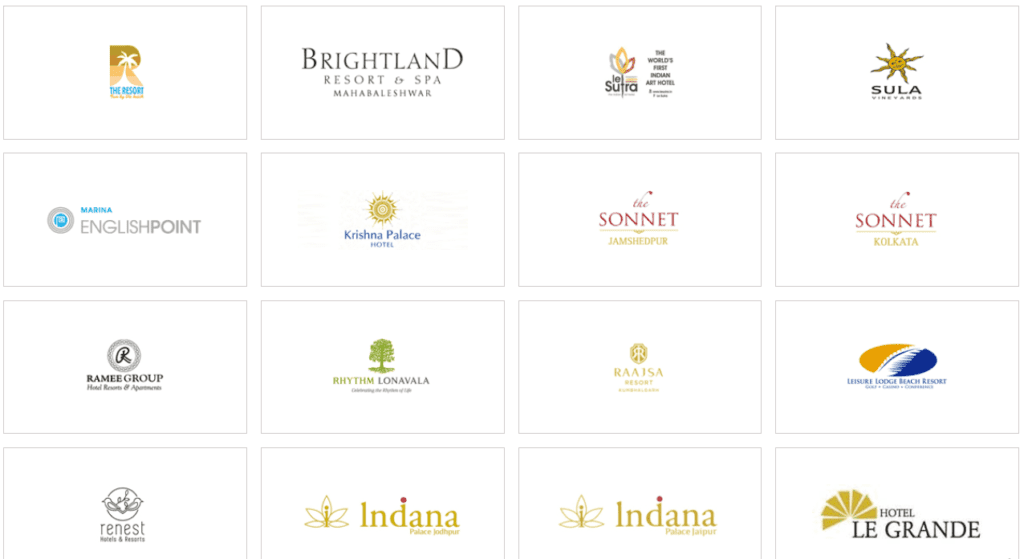
Do you know what is common between big hotel chains Hyatt, Ramada, and The Leela?
They all use revenue management strategies and software. In addition, other key players in India that use revenue management include Taj, Shangri-La, and even Intercontinental hotels.
Revenue Management plays a crucial role in a hotel’s success. With the right pricing and revenue strategy, hotels can offer their rooms at a greater revenue. They can give it to the right customer at the right time and at the right price through the right distribution channels.
The global revenue management market is expected to grow from USD 14.1 billion in 2019 to USD 22.4 billion by 2024.
Automation, technology, and analytics are the three pillars that come together to provide the tools a company needs to implement revenue and price management strategies.
Most Hotel’s Revenue Management is optimized at 40%, and Revnomix ensures your hotel is not one of them.
Revenue Management and its Importance for a Hotel
What is Revenue Management in hotels? Though generating more revenue is the overall goal, we should also understand the other importance of Revenue Management strategies for hotels.
1. Understanding the market demand in Revenue Management permits hoteliers to offer the correct cost to their customers at the perfect time. Understanding guest behavior helps a hotel to know when to hold, raise, or lower rates. Once the hotels become aware of the expected time when they may receive a high volume of travelers competing for a predetermined number of rooms, they can look for certainty. In any case, demand data shows a descending pattern than the last year or any definite period. A hotel can be the first one to reduce the cost.
2. Demand forecasting in Revenue Management occurs when customer request fluctuates and changes the rates! What’s more, expecting permits an operation team to design plans and budgets. The method helps the Sales and Marketing group to build up a successful Revenue Management strategy throughout the year.
3. With the help of a successful Revenue Management strategy, the hotelier will comprehend his clients’ booking conduct better. How early do they book, which sort of room and for what rates, for instance! With the pick-up analysis and the peak nights, this data will make it simpler to fix the Length of Stay.
4. The information collected will assist in strategizing shrewd objectives for your hotel regarding budget, future rates, future speed, and Brand reputation. Likewise, you will continually track your goals and accomplishments.
Difference between Yield Management and Revenue Management
Revenue Management means predicting customer behavior to optimize pricing, product, and channels. It boosts revenue through automation and data analytics.
A similar concept that depends on consumer behavior predictions is Yield Management. But it only focuses on the sale of fixed, time-limited inventory like hotel rooms. Let’s take a look at the key differences below:
Revenue Management:
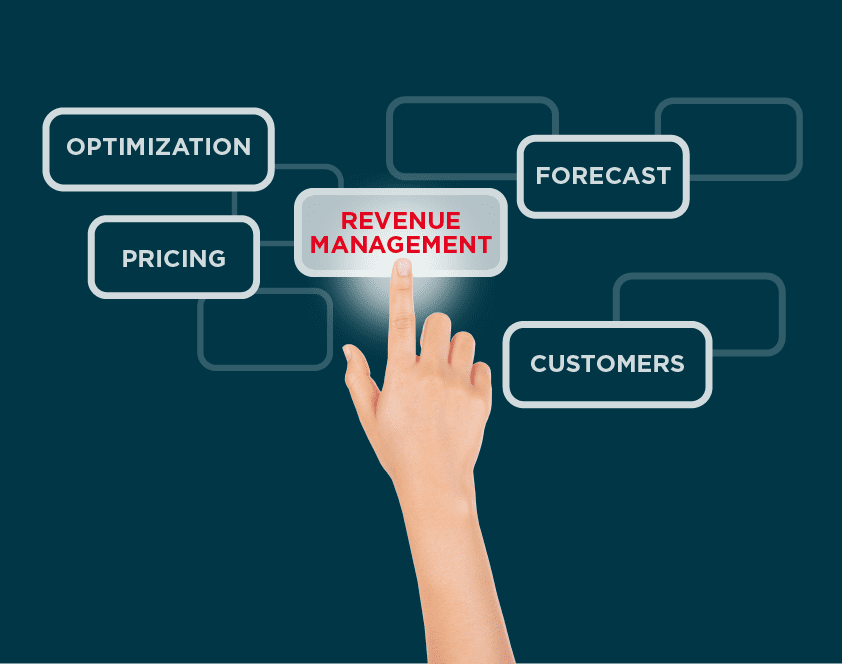
1. Revenue Management takes into account revenue from bar sales, room service, spa bookings, etc. Revenue Management strategies take costs related to various channels into account.
2. Revenue Management strategies use wider KPIs and metrics that include:
◉ Rev PAR (revenue per available room)
◉ GOPPAR (gross operating profit per available room) etc.
3. With a data-driven Revenue Management and pricing strategy hotels can gain a competitive edge.
Yield Management:
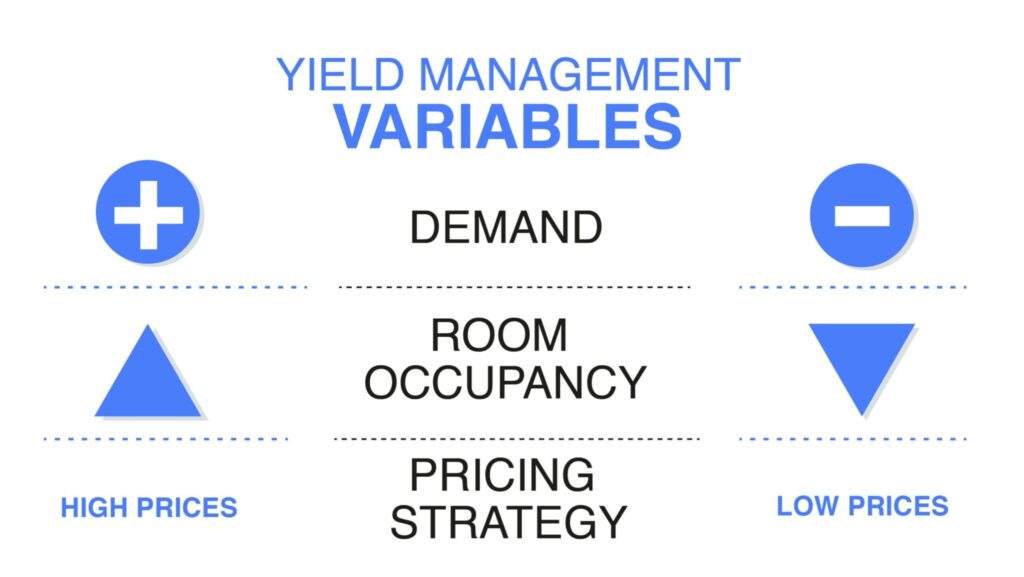
1. Yield Management for hotels identifies restrictions for the sale of hotel rooms to maximize revenue. For example, the maximum length of stay is a restriction applied as per demand. When the demand is low, hotels can be flexible to motivate longer stays.
“Higher Demand=Higher Rates”
2. Hotel managers can use yield management to remove pricing errors by using a hotel management strategy. Prices based on demand forecasting rather than expected booking remove human errors.
Optimizing results is a major part of hotel management. And yield management and Revenue Management strategies both have a part to play. Yield management is another branch of Revenue Management that can be useful for managing hotel rooms.
8 Hotel Revenue Management Strategies
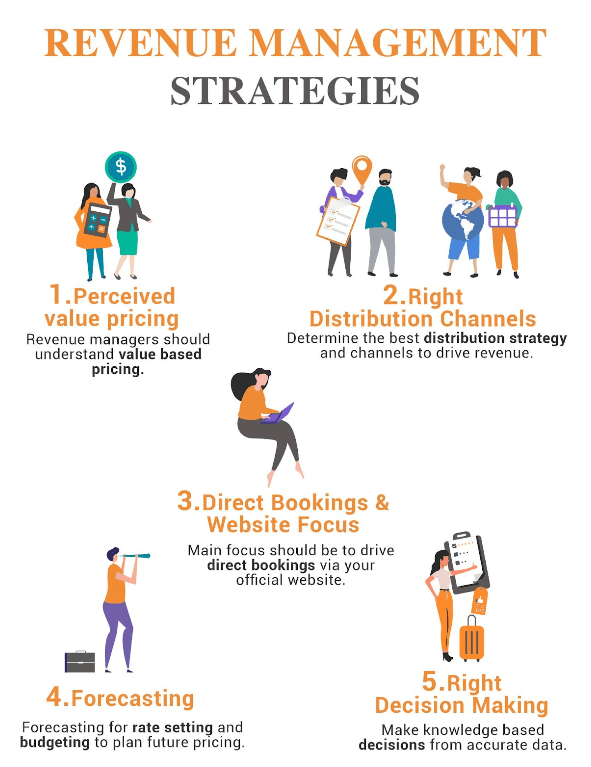
The Revenue Management strategies you can use to grow your hotel business and maximize revenue include:
Market Analysis: Where is the demand coming from? What impacts seasonal demand? Asking these questions will help you to adopt an effective Revenue Management strategy. You must know what your customers want and need. Also, you must study the competition in the market. This will help you to make strategic decisions in terms of price, discounts, etc.
Segmentation: Segmenting your customer base is one of the best strategies to boost hotel revenue. Analyze various consumer demographics as well as their patterns of when and how they make hotel bookings. Do they make direct bookings or do they use OTAs? You can optimize prices based on different segments. It will help you in boosting customer loyalty.
Department Coordination: It is crucial to achieving coordination between the various different hotel departments like sales and marketing. Get together with the key decision-makers from each department. Make changes to your Revenue Management strategies with the help of these department heads. This will ensure your customers get a consistent message.
SEO: By using SEO to increase the visibility of your website and company, you can reduce hotel Revenue Management challenges. Leverage SEO to attract a global audience. Use blog posts and search terms and topics to get more attention. This will help in increasing revenue.
The Right Pricing: The right pricing strategy matters. Prices can be based on other hotel prices so your hotel gets a competitive edge. During off-seasons, you can give discounts to attract more customers. You can also use another approach in which you can offer value through freebies etc. but still keep the room rates high.
Direct Bookings: When you provide big discounts for direct bookings, most customers book directly and not via online travel agencies (OTAs). Encourage customers to book directly so they don’t have to pay commission to a third party. You can start a reward program for direct bookings.
Mobile Optimization: India has over 1.2 billion mobile users. Ensure your website is mobile-friendly, which means pages load quickly and correctly on mobile devices. Also, you must make sure that your reservation process is optimized. So that customers can book rooms directly from their mobile devices and not a desktop.
Revenue Management Services: For a beneficial Revenue Management strategy, you can hire a Revenue Management company that offers hotel Revenue Management services. They bring their knowledge, expertise, and experience. Hotel Revenue Management consulting will save you time and money.
I want expert revenue management
How can Revnomix Help
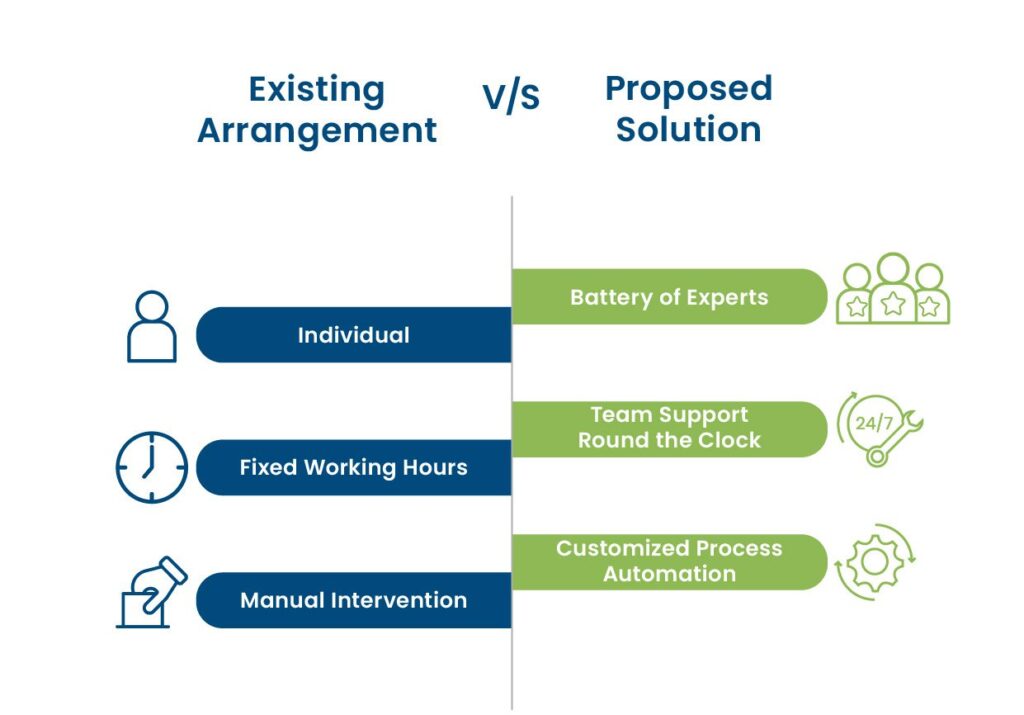
Revnomix is a Hotel Data Analytics & Revenue Management Solution Company. With Revnomix, hotels can process data, make accurate decisions and grow their business.
They use years of experience, the latest tech, and customer support to make data analytics and Revenue Management seamless. Take a look at the Revenue Management strategies below:
Hotel Harbour View
Hotel Harbour View is a luxury boutique hotel located in Colaba, Mumbai, India. The hotel was a rest house earlier, which was converted into a guest house and recently remodeled into a hotel. The biggest challenge was to position it as a hotel in the market and on OTAs and increase visibility.
Strategies Adopted
◉ A new positioning strategy with fresh content for listed OTAs
◉ New Channels added to capture the market and increase visibility.
◉ Dynamic Pricing strategy to attract the right demand at right time.
◉ Measures taken to keep continuous inventory helped to increase the length of stay.
The Hotel started working with Revnomix in December 2017. The efforts of the Hotel Harbour View and Revnomix team resulted in:
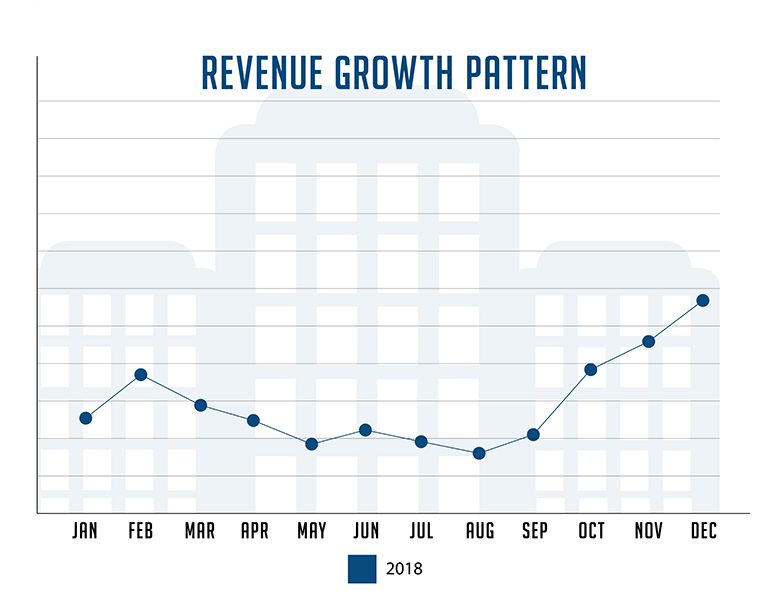
◉ Improved positioning on OTAs
◉ Growth in occupancy and ADR
◉ Improved length of stay
The Taj Tristar
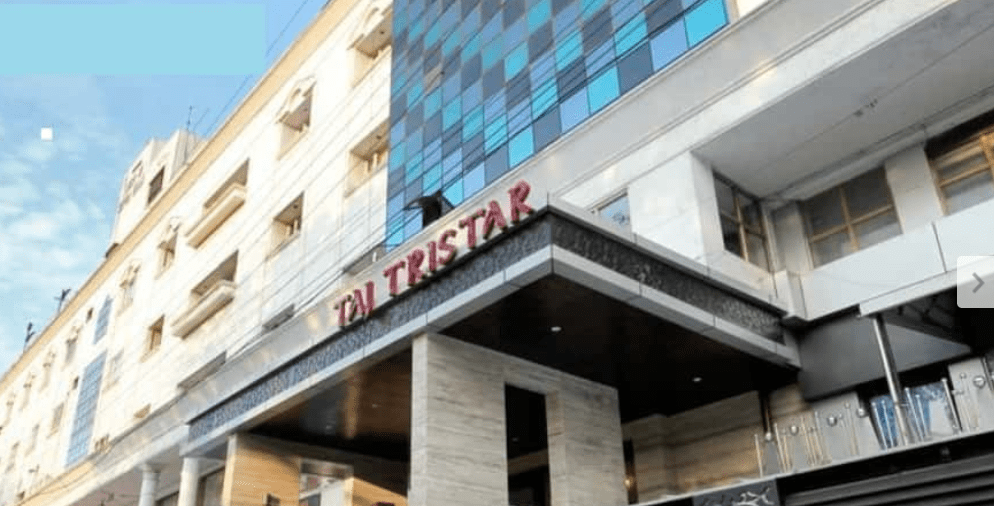
Established in 2001, The Taj Tristar is a 3-star hotel located in Telangana. The hotel was not getting enough bookings from the leisure and non-corporate segments. The hotel’s ranking on OTAs was low. The hotel was facing a major challenge of low occupancy overall.
Strategies Adopted
◉ Added new content on OTAs
◉ Pricing was changed as per data analysis
◉ Daily monitoring of performance to identify yielding gaps
These strategies were implemented as part of the Revnomix Hotel Data Analytics services and resulted in:
◉ Improved hotel ranking across OTAs and meta searches
◉ Increased volume and revenue.
◉ The number of rooms sold on basis of the Day of Week pattern increased by 74% year on year.
◉ The growth in revenue generated by DOW increased on average by 55% compared to the previous year.
The Indana Palace

Indana Palace is a luxury hotel located in Jaipur, Rajasthan. The hotel offers conference venues & facilities, a spa & health club, restaurants, and a swimming pool. The market segment was unaware of the brand presence. The competition was higher as Jaipur is a major city. The pricing strategy adopted by the hotel was not in sync with its products and positioning in the market.
Strategies Adopted
◉ Effective positioning strategy on their website and OTAs.
◉ Efficient pricing strategy on the basis of competition
◉ Improved booking pace by using a dynamic pricing strategy
The strategy resulted in:
◉ Increased revenue and sales
◉ Improved visibility
Revenue Management Software and its Benefits
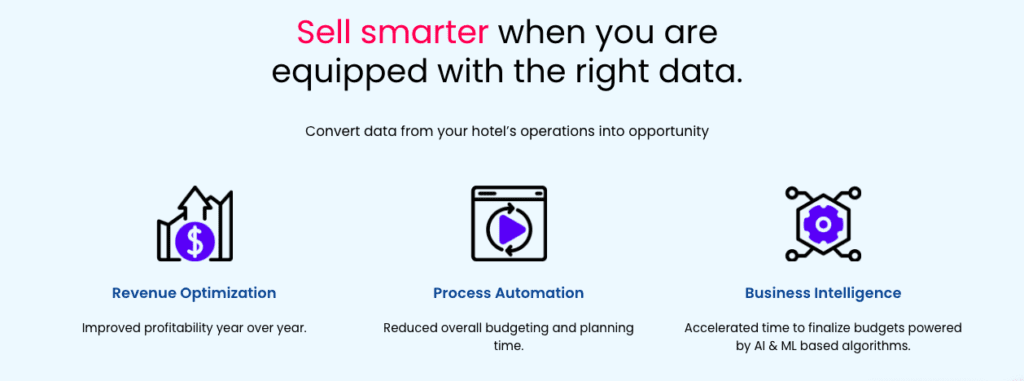
The hotel industry is ever-changing and recovering from the Covid-19 pandemic. And how hotels handle Revenue Management is also changing post the pandemic. RMS and its benefits are becoming crucial in today’s dynamic and uncertain markets.
RMS not only automates and optimizes your prices but it is a useful tool for your Revenue Management team. A Revenue Management team can increase RevPAR with RMS and drive long-term revenue strategy. How hotel management system works?
Revseed is a leading RMS powered by AI and ML algorithms to provide you with accurate pricing strategies and boost revenue. Boost Top Line Revenue at your Hotel by up to 20%.
Study the Market for Future Demand Data
You should invest heavily in data collection if you want to manage revenue in your hotel effectively. This is the first step in gaining insights into your target market. Future demand data from market insight is ingested by Revseed along with millions of other searches and pricing data sources like OTAs, holidays, meta-review sites, etc.
Revseed users will gain a unique insight into peak demand days and market anomalies from demand data that predicts hotel booking demand and intent in all areas, 365 days ahead in the future.
Automate & Adjust Hotel Price
A crucial part of Revenue Management strategies is forecasting. Revenue Management software is used for adjusting and optimizing hotel prices through automation. Above all, you can map where demand comes from in the hotel industry.
Revseed pricing algorithm decides the ideal room rate at any time to boost your hotel revenue. Revseed works for your revenue optimization round the clock and 365 days a year.
Optimize Distributions Channels to Boost Revenue
Optimizing your distribution channels can build trust with your customers and enhance your brand image. Revseed clearly shows what your hotel offers to the target customers. As a result, your customer can easily get the best hotel rooms at the best price while boosting the revenue of your hotel.
Reporting
Keep tracking your progress with our infinite reporting capabilities. There are many RMS options in the hotel industry. But Revseed delivers simple-to-use hotel Revenue Management solutions that can be used by anyone. It is designed with automation in mind and to increase RevPAR.
Improve your Management KPIs and Metrics
Let the system calculate everything and run all the business processes smoothly for you. So you and your team can focus on other strategic tasks and decisions. Also, Revseed’s primary goal is to balance occupancy and ADR to drive more revenue per available room. As a result, you make better decisions that reduce acquisition and labor costs.
KPIs & Metrics
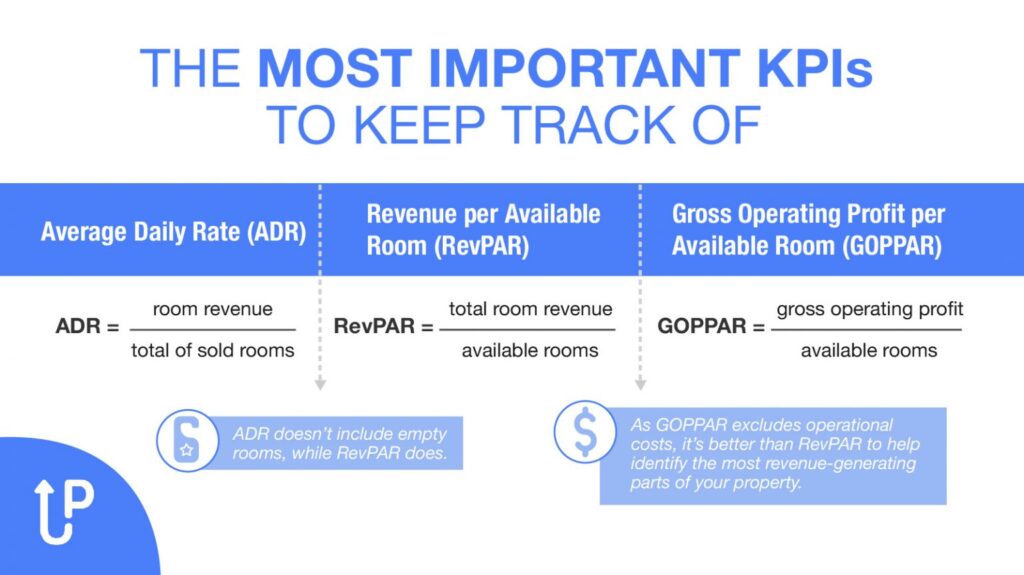
It’s crucial to identify the KPIs that are right for your hotel. How revenue is calculated? Some common financial KPIs and metrics for Revenue Management strategies are as follows:
ADR: What is hotel ADR? Average Daily Rate is used to measure the average revenue that a hotel receives for each occupied guest room per day. By measuring the ADR for your hotel, you’re able to see the average rate that comes from all occupied rooms.
Occupancy Rate: The percentage of occupied rooms at your hotel at any given time is known as the occupancy rate. One of the most useful measures of success is calculated by dividing the total number of occupied rooms by the total number of available rooms.
RevPAR: Revenue Per Available Room is a crucial metric used in the hospitality industry to measure hotel performance. How to calculate hotel RevPAR? The measurement is calculated by multiplying a hotel’s ADR by its occupancy rate.
GOPPAR: Gross Operating Profit Per Available Room is a KPI that helps hotels to determine their performance by calculating the gross operating profit with the number of hotel rooms available. It can also be easily applied to other industries.
Revenue Management Software Features
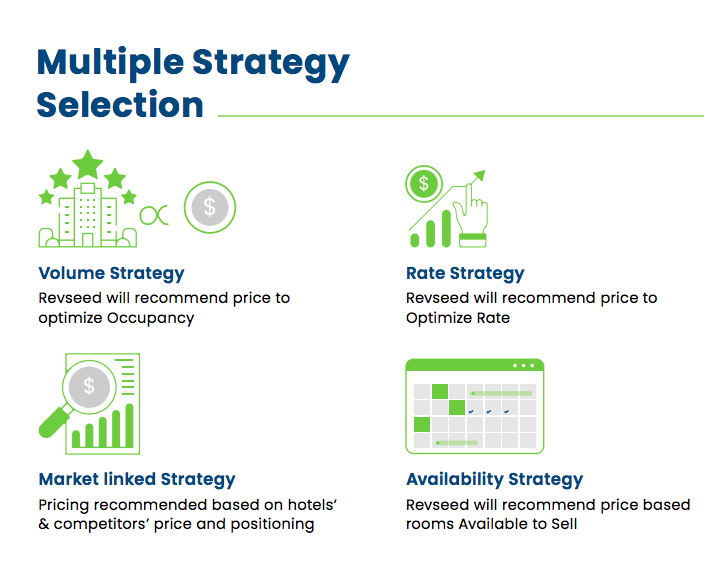
Hotel revenue optimization software helps with tracking and even automating many hotel practices. Here are some features that a good RMS offers to formulate the best Revenue Management strategies:
Integrations: Hotel Revenue Management Software should flawlessly incorporate PMS, CRM, CRS, and booking motor. It should be a two-way association, permitting different frameworks to connect with one another and share information.
Metrics Tracking: A good RMS will assist in keeping track of KPIs and metrics. It should be able to calculate metrics over a range of time periods and provide updated metrics on where you are right now, where you’ve been, and where you are going.
Pricing Data & Recommendations: A top-notch RMS will compile pricing data for you if your competitors publish pricing data online. It can perform the task of scanning what they’re charging and when. Also, you can use pricing models that are tested and come with your RMS. It provides you with price recommendations so you can adjust prices using your own research and expertise.
Revenue Estimates: The software will be able to project what your revenue will be in the future. It has the data of what you’re charging and when, as well as rough forecasts of what you anticipate the demand to be. RMS can help you develop these forecasts.
Revenue Management Process
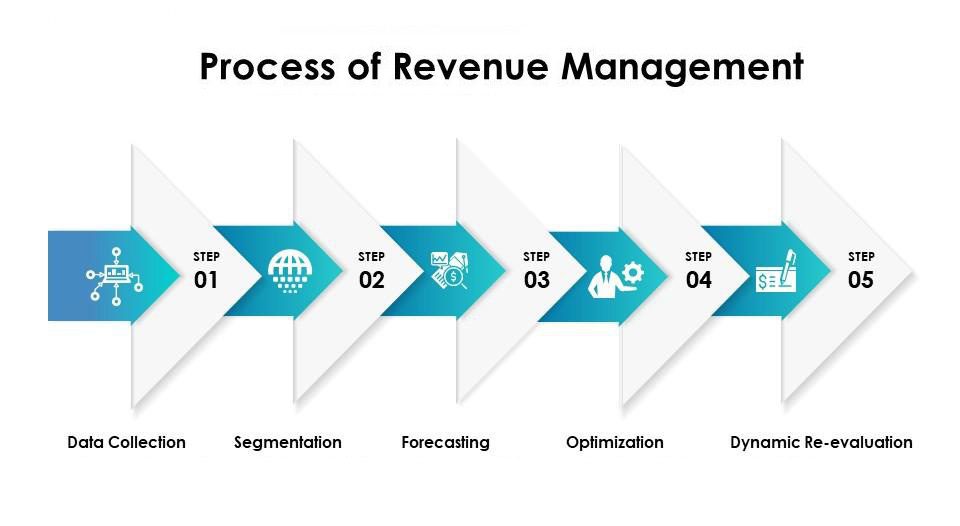
It is beneficial to approach Revenue Management strategies using a systematic process. From data collection to decision making, the five steps of the Revenue Management process include:
Step 1 Data Collection: In the first step, you’ll want to collect relevant data. Using RMS, you can automate the data collection rather than doing it manually.
It helps to focus on key areas:
◉ Offerings and items that you are selling
◉ Regular and potential customers
◉ Weekly, monthly and seasonal calendar
◉ Competitors & comparables
◉ History of your customers, strategies, past events, etc.
Step 2 Segmentation: After step 1, you have a tonne of data that can be divided up in a thousand different ways. This is known as segmentation. RMS makes the segmentation process easy by automating it. You can segment:
◉ By the day of the week
◉ By price
◉ By promotions and more
Step 3 Forecasting: You can begin predicting demand over time and by customer type using recently collected and historical data and segmentation. The results of other forecasts can be a useful source of data for your forecasts.
If your data is low-quality, your forecasts will be unreliable. A good RMS delivers reliable data and forecasting to adjust your hotel prices and map where your demand comes from accurately.
Step 4 Optimization: In this step, it’s time to make a decision about what your hotel should do. You can manually calculate with detailed forecasts about how many customers of which type are going to consider your products and services on a given day.
But manual processes are subject to errors and can lead to bad decisions. Many RMS offer proved, built-in optimization formulas for better decision-making and optimized pricing to boost revenue.
Step 5 Dynamic Re-evaluation: The above steps and past results need to be re-evaluated on a daily basis. It’s crucial to know what is working and what is not and why.
A competitor might have changed their pricing strategy, customer behavior might have changed over time and even the process was not executed properly. But RMS provides detailed reporting to track your success or failures to avoid such cases.
Conclusion
Hotels experience huge swings in demand over time and the world is becoming more unpredictable. It is crucial to anticipate and react to these changes in customer needs, and changes in who their customers are. When it comes to satisfying customer needs and giving them the right product or service at the right time, place, and price, Revenue Management strategies, software and services can be crucial.
Do you want a hotel revenue manager for hire? Get in Touch with us today for all your Revenue Management projects.